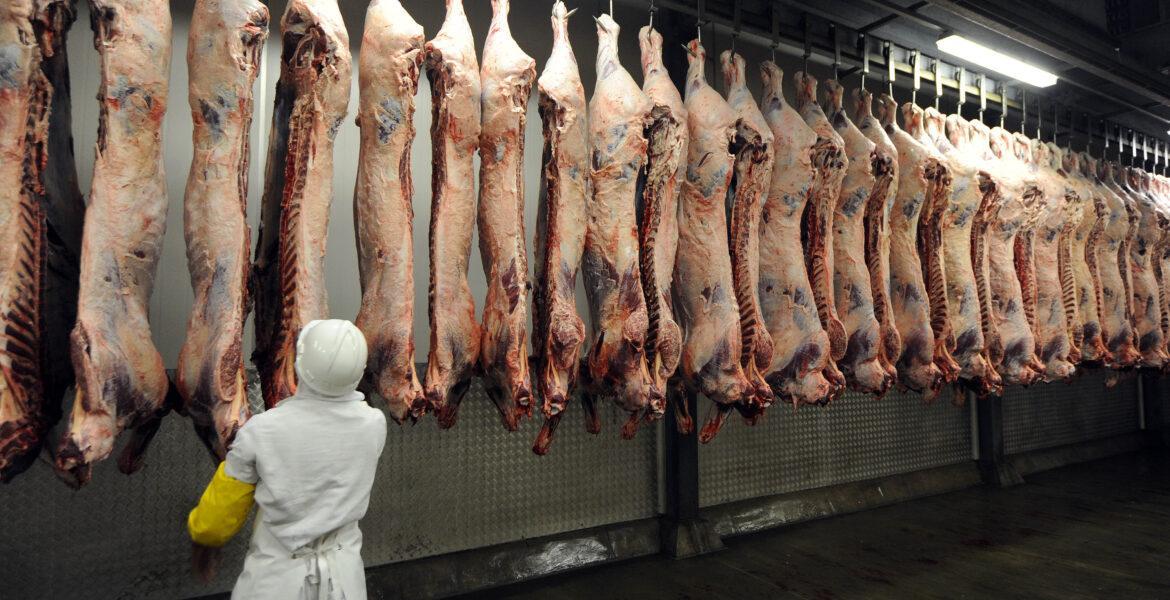Africa-Press – Botswana. Government is in the process of establishing the Meat Industry Regulatory Authority (MIRA), a bill in respect of which has already been presented in Parliament.
Officiating at the 49th edition of the Ghanzi Show on Friday, Minister of Agriculture Mr Fidelis Molao said MIRA was intended to liberalise the beef industry and promote competitiveness of the meat sector by allowing full participation of all key value chain players towards the general growth of the entire meat industry.
He said the MIRA bill would go through committee stage before the ongoing session of Parliament came to a close, adding that once in force, the law would also serve to remove monopoly and open up the meat sector.
The minister hastened to assure farmers that despite their reservations, which government was aware of, they stood to benefit from MIRA.
On a different issue, Mr Molao said the recent revision of the live export dispensation will see each exporter being allowed to export only twice per month from July to September and once a month from October to December, and that the export of live cattle for slaughter would come to an end in December as originally envisaged.
Mr Molao added that the export of beef and beef products from licensed export facilities would however continue until March 2024.
He said it was critical that the country invested in the beef industry by improving breeds.
He said it was for this reason that government was improving all Artificial Insemination (AI) camps nationwide and was encouraging Batswana to make use of the artificial insemination programme.
“We have also added value by buying extra high quality bulls from the United States of America in Texas to improve and augment available bulls and semen,” he said.
The minister further indicated that plans were afoot to reduce fees for courses offered at the AI centres to improve the uptake by farmers.
Turing his focus to farmers in the Ghanzi District, Mr Molao said they deserved commendation for their commitment to helping the nation break free from the shackles of dependency on other countries for food.
He said the Ghanzi show, a spectacle in a league of its own, should inspire farmers from the rest of the country to pull their weight in contributing meaningfully towards the attainment of food self-sufficiency.
“The performance and commitment of farmers in the Ghanzi District is commendable and can be used as an example for the rest of the country to benchmark on. It is estimated that during the financial year 2022/2023, Ghanzi District had an off-take of 43 671 cattle, and 490.58 tonnes of meat,” he said.
Mr Molao added that a total of 32 691 cattle were exported to South Africa, and that in the same financial year the district had an off-take of 1 050 sheep, 2014 goats and 7.18 tonnes of mutton was produced from the district.
He stated that since the inception of the live export dispensation in October 2020 up to May 2023, the country exported a cumulative figure of 438 140 cattle to neighbouring countries, chiefly South Africa compared to 58 017 cattle that were slaughtered at the Botswana Meat Commission.
Regarding challenges specific to the region, Minister Molao said the constant destruction of Kuke cordon fence by elephants continued to pose a threat of disease invasion into the Ghanzi District; a threat that he said government was doing its absolute best to prevent.
Mr Molao said despite Ghanzi District having remained Botswana’s undisputed beef capita, the country was now witnessing mindset change as farmers in the district were now convinced that the region was also conducive for arable farming.
“We have witnessed 390 farmers within the district that have ploughed and planted 777 hectares of cereals, legumes and pulses.
The district has 19 horticultural projects and effective April a total of 3 313 tonnes of various vegetables was produced from 183 hectares,” he said.
Water Utilities Corporation (WUC) Chief Executive Officer Mr Gaselemogwe Senai said being the main sponsor of the Ghanzi show afforded the corporation an opportunity to expand the scope of its corporate social responsibility programme.
He said WUC had chosen agriculture as its primary corporate responsibility in acknowledgement of the fact that the success of the sector was reliant on water availability.
Mr Senai said while the Ghanzi region presently had no water supply challenges, WUC anticipated a possibility of a future conflict or competition for the resource, given the district’s evolution into irrigated crop production,hence the corporation was already working on mitigatory factors to the potential challenge.
Ghanzi show chairperson Mr Thuso Mackenzie said the show bestowed a sense of pride on the people of the district.
He applauded exhibitors, especially in the livestock categories, saying with the wealth of experience that many of them had in the livestock sector, they were an inspiration that budding farmers could hold on to in pursuit of their own farming ventures.
He also paid tribute to the predecessors of the show, noting that they had laid an unshakeable foundation that many generations would build upon in helping the show scale even greater heights.
The show was held under the theme, Self-Sufficiency and Sustainable Production of Basic Foods – Our Reset Agenda. Ends
Mr Mackenzie (left), Minister of Transport and Public Works, Mr Eric Molale (second left), CEDA CEO, Mr Thabo Thamane (centre) and Minister Molao (right) at the 49th edition of the Ghanzi Show on Friday. Minister Molao said government was in the process of establishing the Meat Industry Regulatory Authority (MIRA), a bill in respect of which had already been presented in Parliament. He assured farmers that they stood to benefit from MIRA.
For More News And Analysis About Botswana Follow Africa-Press






